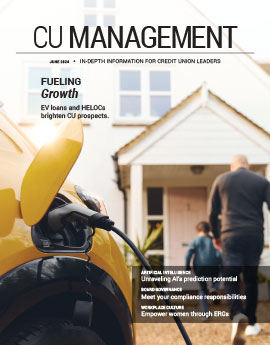5 minutes
Small business lending supports community mission of CDFIs.
Adapted and reprinted with permission of Next City
Presenting on the history of community development finance at a CommonBound gathering, Melissa Marquez recalled how her mother would come home in tears from her job as a loan officer in San Diego in the 1970s.
Marquez’s mother was sick of working for a big bank that refused to lend to the residents of the primarily Mexican-American community of Barrio Logan, even though they were loyal customers. “That really affected me. That’s why I’m running a credit union,” said Marquez, now CEO of $18 million Genesee Co-Op Federal Credit Union, Rochester, N.Y.
Marquez and her co-presenters described the roots of credit unions as a means of survival for communities that faced systemic racial and other discrimination from traditional financial institutions. Focusing intensely on members, credit unions continue to specialize in consumer loans like home mortgages, home repair loans, car loans and loans to pay medical bills.
While there’s still plenty of discrimination to counter in those spheres, credit unions are increasingly feeling the pressure to venture more into small business lending. Genesee Co-Op FCU recently made its first loan to a worker cooperative, a line of credit to Small World Food Collective, a worker-owned bakery and fermentery in Rochester, N.Y. More broadly, the credit union is part of a city-led initiative to incubate a network of worker cooperatives connected to its anchor institutions.
“Because credit unions are financial cooperatives, it’s really important in our work to collaborate with and support other worker co-ops that are trying to start and formalize,” Marquez noted.
Whether they serve worker-owned cooperatives or conventional small businesses, credit unions still face key obstacles to small business lending. Most credit unions can have only 12.25 percent of their loan activity in business lending, per regulations of the National Credit Union Association. That said, credit union business lending is up, from $5 billion in 2002 to $46 billion in 2014, according to Blake Myers, who leads business lending initiatives at the National Federation of Community Development Credit Unions.
NCUA allows low-income credit unions to apply for an exemption from the business lending cap, which Genesee Co-Op FCU has obtained. The regulatory agency has also made several recent reforms to be more conducive to small business lending by credit unions. Notably, as of May, in certain circumstances credit unions are now permitted to make business loans without requiring a personal guarantee from the owners.
The personal guarantee requirement has long prevented many small-business owners from seeking credit from otherwise business-friendly and community-minded credit unions because owners didn’t want to risk taking on that personal liability.
Adhering to its own policies, Genesee Co-Op FCU did ask for personal guarantees from three of the principal worker-owners of Small World Food Collective, whose entire worker-ownership had to vote unanimously to take out the line of credit. “They’re small like us, so it wasn’t hard to get written proof of the unanimous vote,” says Deniz Akman, consumer and business loan officer for the credit union. “It’s amazing how much they’ve grown. If they didn’t get this line of credit from us, they would have gone somewhere else, and we didn’t want to lose them as a client.”
Navigating the risks of small business lending is a novel challenge for many credit unions, and hiring that experience can be expensive. An alternative is to retain a credit union service organization to take on some or all business lending operations, but that can also prove costly, and the CUSO’s underwriting standards may run counter to a low-income credit union’s commitment to lend to startup business clients, Myers notes.
Another way to deal with making riskier loans is by joining the Small Business Administration’s 7(a) loan guarantee program. While it’s a significant paperwork burden, Myers says, the 85 percent government guarantee on each loan helps reduce losses for credit unions. Low-income financial cooperatives especially need that kind of protection to be able to make riskier loans with members’ savings. Of the roughly one-third of credit unions that do small business lending, Myers estimates about 16 percent participate in the SBA program.
To help with SBA paperwork, the NFCDCU has partnered with Community Reinvestment Fund, a Minneapolis community development financial institution, to encourage members to use Spark, CRF’s online tool for managing small business loan applications. CRF was one of the first lenders in the SBA’s Preferred Lending program, meaning that the SBA found the lender so reliable that it no longer requires preapproval of CRF’s 7(a) loans. While it can be used for any small-business lending, Spark is tailored specifically for SBA business loans, helping to generate all the paperwork necessary to get through the process in a user-friendly, web-based interface.
Credit unions’ untapped potential to support small businesses in underserved communities is immense. Nationwide, CDFIs have $108 billion in assets. CDFI credit unions have just over half of those assets, but 89 percent of their lending activity is still consumer loans. Another challenge on NFCDCU’s radar is simple awareness. Later this year, the federation is partnering with the NY State CDFI Coalition to launch the NY State CDFI Business Lending Network, which will offer a simple online map and platform to connect small businesses with CDFIs near them, including credit unions like Genesee Co-Op FCU.
“We’re really looking at these tools to help credit unions fill that gap and provide a fair alternative to these online, predatory lenders in many cases, and really help fill the market need,” Myers says.
Oscar Perry Abello is a Next City 2015-2016 equitable cities fellow. A New York -based journalist with a background in global development and social enterprise, he has written about impact investing, microfinance, fair trade, entrepreneurship and more for such publications such as Fast Company and NextBillion.net. This story was originally published on NextCity.org, which publishes daily news and analysis on cities. Learn more about Next City by following them on Twitter and LinkedIn.









